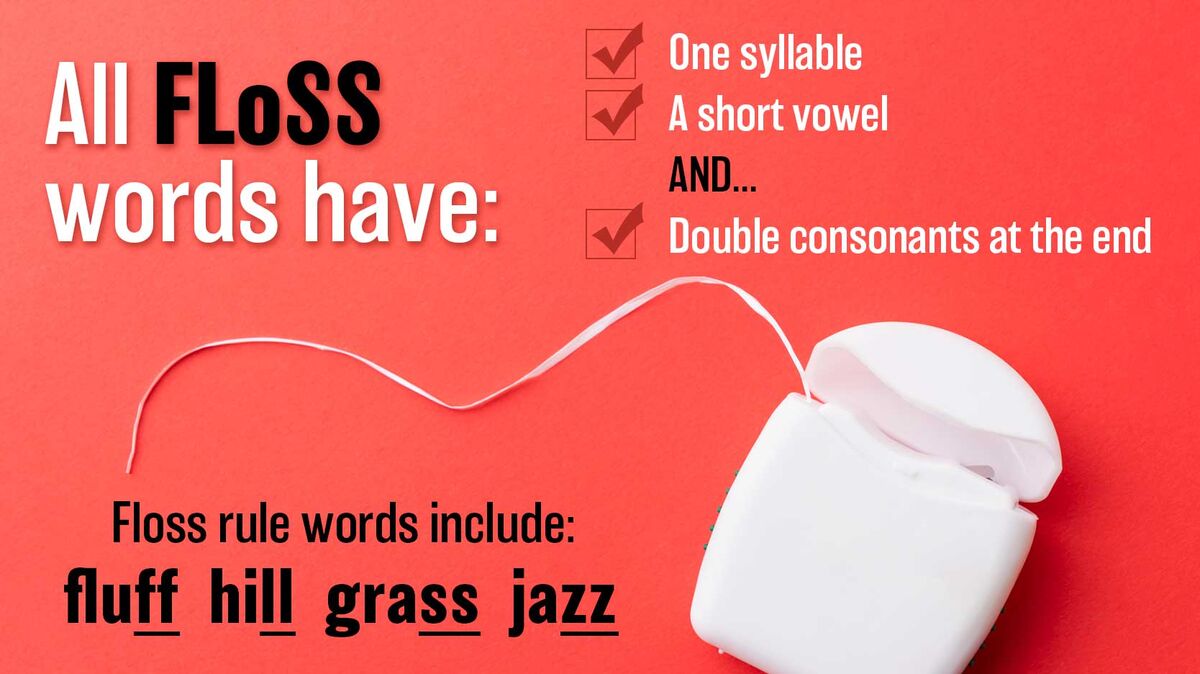
Flossing is part of your dental routine, and now it’s part of your spelling routine! The Floss rule for spelling makes it easy to remember how to end many one-syllable words. For more help and examples, keep reading all about the Floss rule for spelling.
Floss Spelling Rule: Doubling F, L, S, and Z
The Floss, or FLoSS, spelling rule helps students understand when to double the letters “f,” “l” and “s,” as well as “z,” in words. These letters double at the end of a word when they follow a short vowel sound. Floss rule words include:
- double “f” words - huff, puff, staff
- double “l” words - hill, pill, stall
- double “s” words - grass, miss, boss
- double “z” words - buzz, fizz, jazz
The word “floss,” which is itself a double “s” word, helps students remember when they should double consonant word endings. The letter “z” doesn’t appear in “floss,” but it still follows the rule. Basically, if the consonant appears in the word “floss,” (or “FLoSSeZ”), double it!
Exceptions to the Floss Rule
Like most spelling rules in English, there are exceptions to the Floss rule. The main exceptions are words that end in “s” but sound like “z” (known as voiced consonants). Words that fall into this category are:
- words that end in “s” but have a “z” sound (was, is, his)
- plural words that end in “s” (dogs, wigs, boys)
- present tense verbs that end in “s” (sings, runs, falls)
Another category of exceptions are words that end in a blended consonant sound, such as “barf” or” “wolf.” Other common words that don’t follow the Floss rule include:
- bus
- chef
- gas
- if
- pal
- this
- yes
If you get confused about which words follow the Floss rule, spell them out and see what looks more correct. But because there are so few words that don’t follow the rule, you’re on the safer side assuming that the word you’re writing does follow it.
Ideas for Teaching the Floss Rule
Spelling games are a great way to reinforce spelling rules in the classroom. The name of the Floss rule brings up lots of cute floss-themed opportunities for teaching this spelling rule in the classroom. Use one or more of these ideas to help learners remember the Floss spelling rule.
Floss With Spelling Words
Reinforce both dental hygiene and spelling practice. With a little set-up, this game is a fun and memorable way to learn the Floss rule.
- Using butcher paper or posterboard, draw a face with a toothy smile. (You can also use a jack-o-lantern if you’re playing in the fall!)
- Cut out the spaces between the teeth. There should be enough space for small pieces of paper to slide through.
- Divide the class into small groups and have them write Floss words onto small pieces of paper.
- Tell them to tape their words onto long pieces of string.
- Invite each team to the poster mouth and have them “floss” the teeth. Double check with the class that the word is really a Floss word!
Floss Board Races
Get kids up and running with this timed board game. They’ll love the competition and learn important spelling guidelines at the same time.
- Write “F,” “L,” “S,” and “Z” on the board with space below them.
- Have students copy the categories onto their own papers or sheet of butcher paper.
- Split the class into small teams and set a time limit for them to write down as many words in each category as they can.
- When time is up, see which team has the most words. Bonus points for words that other teams didn’t write down!
Floss Word Lists
Sometimes there’s nothing like a good old fashioned spelling quiz. Use these procedures to introduce and assess Floss spelling words in the classroom.
- Create a spelling list with both Floss words and exceptions to the Floss rule.
- Quiz students at the beginning of the week to see which words they know, which words are more confusing, and which words they need to review.
- Feature trickier words in warm-ups throughout the week.
- Quiz students again at the end of the week.
- How many Floss words did they learn?
FLOSS Spelling Rule System for Phonemic Pronunciation
A less common “floss” spelling rule involves a complicated phonetic system based on the FEWL (FLEWSY Encoded Word List). In this case, FLOSS stands for “Fonemic Latin-1 English Writing System.” It provides phonemic transcription of standard written American English. For a complete pronunciation chart of FLOSS notation, including examples of works 'translated' into FLOSS, visit WyrdPlay.org.
Master Important Spelling Rules
Learning to spell is a process of memorizing spelling rules and realizing when a word is spelled incorrectly. But there are other ways to master these spelling rules as well. Check out these helpful ways to check your spelling of a word. Once you’ve gotten the hang of it, read through the 100 most commonly misspelled words in English to challenge your spelling skills.